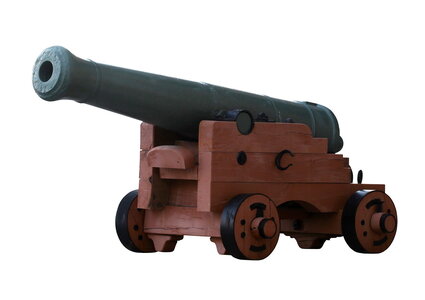
 |
|
|
#1 |
|
Member
Join Date: Feb 2005
Posts: 237
|
Some time ago I acquired a cannon that I subsequently mounted on a tripod-like contrivance, viz
 I used the welded on pivot contrivance as a point of articulation...  Generally cannon are mounted using things called trunnions  Mine has no trunnions so I sort of assumed that it would not be mounted on a carriage per se. Now recently I was perusing the Zeugbuch Kaiser Maximilian (Book of armaments which is worth a gander). I knew there were examples that resembled my cannon but, for reasons lost in the mists of time, I never paid much attention.   That is mine and they mounted it on a carriage. Note that the pin affixing it to the carriage is below the body of the weapon.  Now generally, elevation adjustment is accomplished by use of a qizmo that lifts the rear of the cannon. Here no vertical movement is possible. How did they aim it? Damn odd. BTW this book definitively establishes a terminus ante quem of ~1500 for this type of cannon. I have no problem dating it at ca. 1500. Book of armaments ... https://www.digitale-sammlungen.de/e...956?page=20,21 |
|
|

|
|
|
#2 |
|
Member
Join Date: Nov 2013
Location: NY, NY
Posts: 9
|
Do you have more photos of the bore, vent, & any other details as well as measurements? Is it iron? The corrosion & lighting make it difficult to tell, but if it is, it very well might be an important early 16th century wrought iron falconet. Corrosion may make it difficult to tell, but if it is of that era there may be proof or guild markings of some kind.
As for adjusting elevation, these early gun carriages often had accommodations for a wedge, screw, or cranequin at the cascabel so the barrel may be adjusted via it's trunnions or pivot. Larger fixed barrels can be adjusted by blocks & wedges under the tail of the carriage stock, or by digging a pit. Picks, shovels, & carpentry tools were essential for an early artilleryman, and such tools are frequently illustrated alongside the ordinance in Maximilian's book. |
|
|

|
|
|
#3 |
|
Member
Join Date: Feb 2005
Posts: 237
|
Sorry, got caught up.
Length o/a is 45". Bore ~1.25" Iron There is what appears to be remnants of paint on the entire length of it. The only illustrations that I have come across are in Max's book. Thing is that if it is mounted in a carriage (as illustrated ) there is no play, the only way to have adjusted elevation would be to raise or lower the trail. Last edited by Ed; 31st May 2024 at 03:40 AM. |
|
|

|
|
|
#4 |
|
Member
Join Date: Feb 2005
Posts: 237
|
I have gone over this object fairly diligently and have not observed any marks. I shall take it out in the sunlight and go over it again.
|
|
|

|
|
|
#5 |
|
Member
Join Date: Feb 2005
Posts: 237
|
BTW ... it was loaded with powder. I flushed it out onto filter paper. It burned but poorly.

|
|
|

|
|
|
#6 |
|
Member
Join Date: Dec 2014
Location: Black Forest, Germany
Posts: 1,207
|
In "Das Feuerwerkbuch von 1420" I found these drawings showing how the elevation of the cannon was constructed. May be this is of interest for you.
|
|
|

|
|
|
#7 |
|
(deceased)
Join Date: Dec 2004
Location: Portugal
Posts: 9,694
|
I would rather think of your piece, not as a cannon, but as one from the haquebut typology. You position it on the (fortication) wall with the hook in the out side, to below prevent you from receiving the kick when you shoot it. It should have the touch hole on the side, not the on the top, to enable to shooter to better aim at the target.
The stock missing on this one, of course. |
|
|

|
|
|
#8 |
|
Member
Join Date: Feb 2005
Posts: 237
|
The touch hole is on the top. The thing on the bottom is really rather to far back. I think it is what is depicted in the Maximilian document.
|
|
|

|
|
|
#9 |
|
(deceased)
Join Date: Dec 2004
Location: Portugal
Posts: 9,694
|
|
|
|

|
|
|
#10 |
|
Member
Join Date: Nov 2013
Location: NY, NY
Posts: 9
|
With those dimensions your gun would class as a light Serpent or "Slangen" as described in Maximilian's book. The illustrations you shared are of "Mittelslangen", which are ~2m long with 6-7cm bores, so nearly twice the size of your gun but in the same family. Here's one of several poems Maximilian wrote about these guns in his book of armaments:
"Veld und mittelslangen wir sein, Han manchen kriegsknecht bracht in pein An stürmen und grossen schlachten, So den kaiser wolten verachten." I'm no hand at 16th c. (or really any) German, but here's a rough translation: "We Field & Medium serpents, have brought many a soldier into torment in onslaughts and great battles, so they will despise the Kaiser" |
|
|

|
|
|
#11 |
|
Member
Join Date: May 2020
Posts: 7
|
I do own an early 18th century cannon carriage which washed on a beach from a shipwreck but the example I have is a bit late and for a Falconet as opposed to Lantaka I'm afraid.
- Last edited by fernando; 3rd July 2024 at 12:35 PM. Reason: Please read rules. Links to active sale sites not allowed. |
|
|

|
 |
|
|